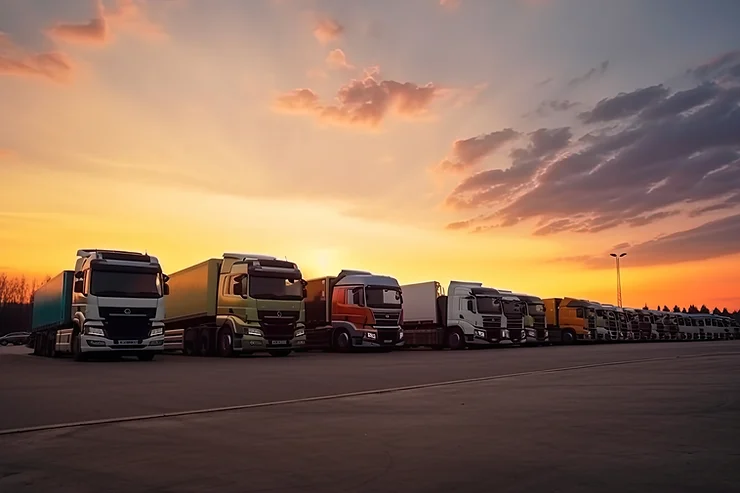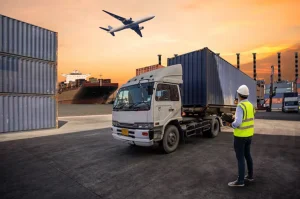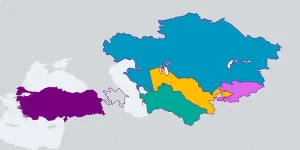Efficient transportation is at the core of successful exports, and land transportation plays a pivotal role. Exporting goods from Europe involves various aspects, and land transportation is a crucial part of the process. Here are some key things to know when exporting from Europe using land transportation:
-
Documentation and Customs Clearance: – Ensure you have all the necessary export documentation, such as invoices, packing lists, certificates of origin, and any required permits or licenses. – Familiarize yourself with the customs regulations and procedures of both the European Union (EU) and the destination country.
-
Transportation Modes: – Europe offers a well-developed transportation infrastructure, including road networks and railways. Decide whether you’ll use trucks, trains, or a combination of both for land transportation. – Consider the type of goods you’re exporting. Some items may require special handling or temperature-controlled transportation.
-
Transportation Provider: – Choose a reliable transportation provider or freight forwarder with experience in international shipping. They can help you navigate the complexities of cross-border transportation.
-
Packaging and Labeling: – Properly package your goods to ensure they are protected during transit. Label packages with clear and accurate shipping information, including destination addresses and handling instructions.
-
Customs Procedures: – Prepare for customs inspections and declarations. Understand the tariffs, duties, and taxes applicable to your goods in both the EU and the destination country.
-
Transportation Routes: – Plan the most efficient transportation routes. Take into account factors like distance, border crossings, and potential congestion. – Be aware of any restrictions or permits required for transporting goods through certain regions or countries.
-
Insurance: – Consider purchasing cargo insurance to protect your goods during transportation.
-
Timelines and Scheduling: – Create a clear schedule for your export process, including pickup, transit, and delivery times. Allow for potential delays due to customs, weather, or other unforeseen circumstances.
-
Security: – Implement security measures to protect your goods from theft or damage during transportation, such as using sealed containers and GPS tracking.
-
Payment and Financing: – Establish a secure method of payment with your buyer, and consider export financing options if necessary. Exporting goods from Europe via land transportation can be a complex process, but with careful planning and attention to detail, you can successfully navigate the various challenges and reach your international markets.
The importance of land transportation for exporting goods from Europe
Land transportation involves the movement of goods by road, rail, or a combination of both. It offers a range of benefits that make it a preferred choice for many exporters. There are several important reasons why land transportation plays a crucial role in the process of exporting goods from Europe:
-
Connectivity: Land transportation networks in Europe are highly developed, providing efficient connectivity between countries and regions. This network of roads, highways, railways, and inland waterways facilitates the movement of goods from production sites to ports or border crossings.
-
Access to Markets: Land transportation allows European exporters to reach various markets quickly and efficiently. Whether goods are destined for neighboring countries or distant regions, reliable land transportation is often the initial phase of their journey.
-
Cost-Effective: Land transportation can be cost-effective for destinations within Europe and nearby regions. It eliminates the need for lengthy and costly ocean or airfreight routes for goods with shorter travel distances.
-
Time-Sensitivity: For time-sensitive products or perishable goods, land transportation offers speed and flexibility. Trucks and trains can cover relatively short distances in a shorter time compared to ocean shipping.
-
Customs and Border Crossings: Land transportation is well-suited for navigating customs procedures and border crossings. European exporters can efficiently handle customs declarations and inspections, ensuring compliance with both European Union (EU) regulations and the specific requirements of destination countries.
-
Reliability: European land transportation is known for its reliability. Roads, railways, and other infrastructure are typically well-maintained, reducing the risk of delays due to infrastructure issues.
-
Distribution Networks: Exporters can use land transportation to efficiently distribute goods to regional distribution centers, retail outlets, and customers within target markets. This supports supply chain optimization and just-in-time delivery practices.
-
Flexibility: Land transportation offers flexibility in terms of the type of cargo it can accommodate. Whether transporting bulk goods, containerized cargo, hazardous materials, or temperature-sensitive products, various modes of land transportation are available to meet specific requirements.
-
Economic Benefits: The land transportation sector generates significant economic activity, providing jobs and business opportunities across Europe. It contributes to the growth of the transportation and logistics industry, supporting economic development.
-
Integration with Other Modes: Land transportation often serves as an integral part of multimodal transport solutions, seamlessly connecting with other modes such as sea, air, and inland waterway transportation to provide end-to-end logistics solutions. In summary, land transportation is vital for European exporters because it offers reliable, cost-effective, and flexible options to reach a wide range of markets. It plays a central role in ensuring the smooth flow of goods from production facilities to customers, contributing to the economic prosperity of Europe and its trading partners.
Transportation modes
When exporting goods from Europe using land transportation, several transportation modes are available to choose from, each with its own advantages and suitability depending on the type of goods, destination, and specific logistics requirements. Here are some common land transportation modes used in European exports:
-
Trucking (Road Transportation): – Full Truckload (FTL): Reserving an entire truck for your goods is suitable for larger shipments or when time sensitivity is a concern. – Less Than Truckload (LTL): LTL shipping allows you to share a truck with other shippers, making it cost-effective for smaller shipments.
-
Rail Transportation: – Rail is a cost-effective and environmentally friendly option for transporting goods across long distances within Europe and beyond. It’s suitable for bulk goods, containers, and non-perishable items. – High-speed rail networks are available in some European countries for faster transportation.
-
Intermodal Transportation: – Intermodal transportation combines multiple modes of transport, such as road and rail or road and sea, to move goods efficiently. It’s beneficial for long-distance transportation and when you need to minimize costs.
-
Inland Waterway Transportation: – Europe has an extensive network of rivers and canals that can be used for transporting goods, especially bulk cargo. Barges and riverboats are commonly used for this purpose.
-
Combination of Modes (Multimodal Transportation): – Utilizing a combination of road, rail, and sea transportation can optimize cost and transit time for long-distance exports. Containers are often used in multimodal transport.
-
Temperature-Controlled Transportation: – For perishable goods, pharmaceuticals, or other temperature-sensitive items, you may need refrigerated trucks or containers to maintain the required temperature during transit.
-
Heavy Haul and Oversized Cargo: – For exceptionally large or heavy cargo, specialized transport equipment and permits may be required. Ensure compliance with weight and size regulations.
-
Hazardous Materials Transportation: – When exporting hazardous materials or dangerous goods, adhere to strict regulations and safety standards for handling and transporting these products.
-
Tracking and Monitoring: – Use GPS tracking and monitoring systems to keep tabs on the location and condition of your goods during transportation.
The choice of transportation mode will depend on factors such as the nature of your goods, destination, budget, and time constraints. Many exporters use a combination of these modes to optimize their supply chains and meet the specific requirements of different markets. Consulting with logistics experts and transportation providers experienced in international shipping can help you make the best choices for your export operations.
TopTrans: Your Partner for Efficient Land Transportation from Europe
At TopTrans, we understand that exporting goods from Europe requires a strategic approach and reliable transportation solutions. With our seven years of industry expertise and a commitment to excellence, we offer you a seamless and cost-effective way to navigate the complexities of international trade.
Our Comprehensive Land Transportation Services
-
Road and Rail Options: We provide a diverse range of road and rail transportation options tailored to meet your specific cargo needs. Whether you are shipping perishable goods, oversized equipment, or delicate items, our experienced team will recommend the most suitable mode of transportation for your cargo.
-
Streamlined Customs Assistance: Navigating customs regulations in European countries can be a daunting task. Our team of customs experts is well-versed in the intricacies of international trade. We handle all documentation, tariffs, and compliance matters on your behalf, ensuring your cargo passes through customs smoothly and without delays.
-
Specialized Cargo Handling: TopTrans is equipped to handle a wide array of cargo, including hazardous materials. Our specialized knowledge and safety protocols ensure the secure transportation of your goods, giving you peace of mind throughout the journey.
Cost-Effective Solutions
– Transparent Pricing
We believe in transparency when it comes to pricing. With TopTrans, you can expect competitive rates with no hidden fees. Our pricing is customized to your cargo’s unique characteristics and transportation requirements.
24/7 Customer Support
– Fast and Responsive Service
Our dedicated customer service team is available around the clock to assist you. Whether you have questions, need assistance with documentation, or require a quote, we are here to respond promptly and provide solutions tailored to your needs.
Get Started with TopTrans Today
Exporting goods from Europe via land transportation doesn’t have to be a daunting task. TopTrans simplifies the process, ensuring that your cargo reaches its destination safely, on time, and within budget. As your trusted partner, we offer you a hassle-free experience and the confidence that your cargo is in expert hands.
Contact us today to learn more about our services, request a fast quote, or inquire about any aspect of land transportation for exporting goods from Europe. Let TopTrans be the key to unlocking your export success. Your cargo, our commitment! 🚚🌍








